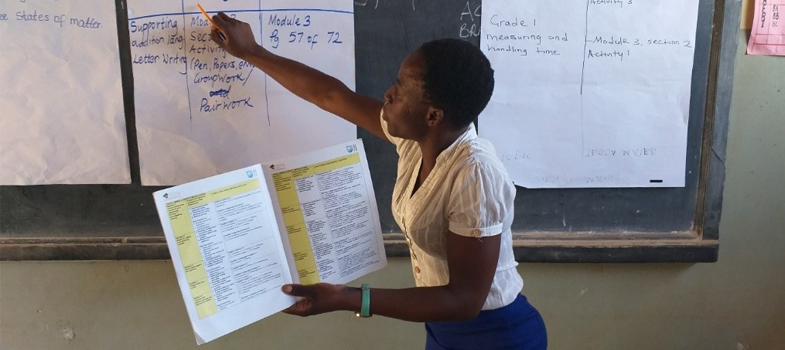Training guide
5. Reflection
In the course 1 training materials you will remember there is a section on the importance of reflection in teaching. As a teacher, when you are planning your lesson you think about what you want your learners to learn and how to achieve this. Taking some time later to reflect on your practice enables you to learn from your experiences and improves your teaching.
Recording progress
An important part of reflection is ensuring you keep a record of your thoughts on the activities you have done in TGMs or lessons you have taught. In course 1 of this enhanced SPRINT programme, you were encouraged to keep a record of when you tried each approach. As you were introduced to and practiced different approaches you were asked to fill in a table like the one below.
|
Developing learner-centred teaching |
||||||
|
Teaching approaches |
Date the approach introduced
|
Date of 1st attempt
|
Date of 2nd attempt
|
Date of 3rd attempt
|
Date of 4th attempt
|
Confident using this approach |
|
1 - Questioning |
|
|
|
|
|
|
|
2 - Pair work |
|
|
|
|
|
|
|
3 - Local resources |
|
|
|
|
|
|
|
4 - Group work |
|
|
|
|
|
|
|
5 - Storytelling, songs, games and role-play |
|
|
|
|
|
|
|
6 - Involving all learners |
|
|
|
|
|
|
|
7 - Monitoring and giving feedback |
|
|
|
|
|
|
|
8 - Eliciting prior knowledge |
|
|
|
|
|
|
|
9 - Assessing learning |
|
|
|
|
|
|
Having followed this programme for a year, and covered nine teaching approaches, you should ideally have completed this table! But don’t worry if you haven’t, you can still do the next activity. Undoubtedly there will be some approaches that you feel much more confident in using with your learners – that’s just natural.
Activity 4.9: Focusing on your own personal developmentGo through all nine approaches and identify the three that you find most challenging to use in your teaching. Now reflect on each of those three approaches and, in your Teacher Notebook, write a short paragraph on why these approaches are difficult for you. Share this paragraph with a colleague who specialises in the same subject as yourself or teaches the same Grade, and together come up with a plan to help you overcome the difficulties you have encountered. Compare your list with someone who teaches a different subject or grade. Try and identify someone who might be able to help you. For example, Numeracy teachers are often less confident about role play than Literacy teachers; Science teachers are often very good at using local resources. |
